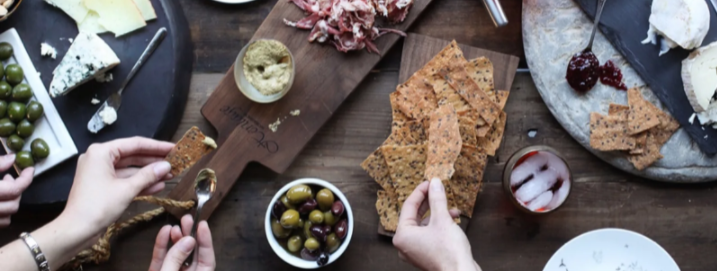In recent years, the term “foodie” has become a buzzword, symbolizing a cultural shift in how we approach eating, cooking, and sharing our culinary experiences. But what exactly has led to the popularity of foodies, and why are more people embracing this title with pride? This article explores the growing phenomenon and uncovers the driving forces behind the widespread appeal of foodie culture.
Rob Raffa: What is a Foodie?
A foodie isn’t just someone who enjoys eating. It’s a person who has a deep passion for food—its history, preparation, and flavors. Foodies are curious eaters who are willing to try exotic dishes, discover hidden restaurant gems, and learn how to make meals from different cultures. They go beyond just eating to satisfy hunger; they treat food as an experience, a hobby, and often a form of self-expression.
The Role of Social Media
One of the most significant contributors to foodie popularity is social media. Platforms like Instagram, TikTok, and YouTube have transformed the way we experience food. People no longer just eat; they document, share, and discuss their meals with the world. Photos of perfectly plated avocado toast, reels of behind-the-scenes restaurant kitchens, and tutorials on how to recreate restaurant-style dishes at home have flooded these platforms.
For foodies, sharing meals is about more than bragging rights. It’s a form of social engagement, a way to connect with like-minded people who appreciate the artistry of food. This visual medium has made gourmet experiences more accessible and aspirational, and it has amplified the allure of being a foodie.
Globalization and the Expansion of Palates
As the world becomes more interconnected, so do our culinary experiences. International cuisines that were once considered exotic or rare are now easily accessible in many urban areas. Thanks to globalization, people have become more adventurous eaters, seeking out flavors from different corners of the globe. Street food markets, fusion restaurants, and pop-up dining experiences have all contributed to the foodie craze.
In addition, cooking shows, food documentaries, and travelogues have inspired people to explore food from various cultures. The rise of globalized media has expanded our understanding of food as a cultural and historical experience, making foodies not just eaters but explorers.
The Desire for Authentic Experiences
In a world dominated by fast food and processed meals, many foodies yearn for authenticity. Whether it’s eating locally sourced ingredients, enjoying farm-to-table meals, or cooking traditional recipes passed down through generations, foodies want to experience food at its most genuine. This craving for authenticity ties into the broader lifestyle trend of mindfulness and conscious living.
Foodies take pleasure in knowing the origin of their food, understanding its cultural significance, and being aware of the impact of their consumption habits. This dedication to quality and authenticity often drives foodies to support local farmers, artisanal producers, and small restaurants.
The Influence of Celebrity Chefs and Cooking Shows
The rise of celebrity chefs has also played a pivotal role in making foodie culture mainstream. Chefs like Gordon Ramsay, Anthony Bourdain, and Massimo Bottura have taken food beyond the kitchen, turning it into entertainment. Cooking shows, food competitions, and culinary documentaries have drawn in viewers who might not have considered themselves food enthusiasts before. These shows showcase not only the culinary craft but also the stories behind the dishes, chefs, and cultures that make food so compelling.
Foodies are often inspired by these programs to try new cooking techniques, ingredients, and dishes at home, feeding their curiosity and expanding their culinary skills.
Food as a Social Activity
The communal aspect of food is another reason for the rise of foodie culture. In many ways, food has always been a social activity, but it has taken on a new dimension in recent years. Food festivals, tasting events, cooking classes, and supper clubs are just a few examples of how people gather around food.
For many, being a foodie is about the experiences shared with others—whether that’s a dinner party with friends, discovering a new restaurant together, or attending a food truck festival. These experiences deepen social bonds and create lasting memories, making foodies more than just people who enjoy eating. They are curators of social and cultural experiences.
The Future of Foodie Culture
As the foodie movement continues to grow, it shows no signs of slowing down. Sustainability, health-conscious eating, and innovation in food technology are expected to shape the future of foodie culture. Foodies are likely to continue exploring plant-based diets, zero-waste cooking, and ethical consumption as they expand their culinary horizons.
Additionally, advancements in food technology, such as lab-grown meat and AI-generated recipes, may offer foodies even more unique experiences to explore. The boundary between food as necessity and food as art will continue to blur, allowing foodies to engage with food in new and exciting ways.
The rise of foodie culture reflects a larger trend in society where people are seeking more meaningful, intentional, and adventurous experiences. With the help of social media, celebrity chefs, and globalized food access, being a foodie has become a way to connect with others, explore different cultures, and indulge in the artistry of food. Whether you’re a home cook trying new recipes or an adventurer seeking out the latest food trend, it’s clear that the world of foodies is here to stay.
